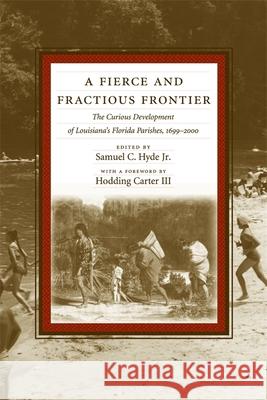A Fierce and Fractious Frontier: The Curious Development of Louisiana's Florida Parishes, 1699-2000 » książka
A Fierce and Fractious Frontier: The Curious Development of Louisiana's Florida Parishes, 1699-2000
ISBN-13: 9780807129234 / Angielski / Miękka / 2004 / 232 str.
Tales of Cajuns, Creoles, and New Orleans decadence dominate both popular and professional impressions of Louisiana and have undoubtedly distracted attention from the region that arguably experienced the most dramatic pattern of development in Louisiana, if not the entire Gulf South. Louisiana's Florida Parishes, located in the southeastern part of the state, have endured a tumultuous evolution, including domination by every major power that invaded North America, exclusion from the Louisiana Purchase, insurrection and the establishment of the original Lone Star Republic, and some of the highest rates of rural homicide recorded in American history. The area was long neglected by scholars until some of its foremost experts came together to explore and recognize its singular identity. This volume is a result of that collaboration and consists of ten essays on the history and culture of this unique territory.
In tracing the progress of Louisiana's Florida Parishes, the book begins with an eye-opening ethnographic history of the territory during its days as a French colony, the brief era of British rule, and slavery as it was practiced under the Spanish regime. A revealing look at the region during the War of 1812 provides a dynamic account of the only major naval battle in the South during that conflict. Subsequent essays give lucid and insightful examination to the area's guerrilla tactics during the Civil War, credit crisis of the postbellum era, and ecological transformation through pine forest harvesting. The final third of the book considers the demographic changes wrought by black labor employed in the lumber mills of the early twentieth century, the challenges confronting a rural, depression-era black community, and recent environmental changes in the parishes that impact ongoing economic development.
A Fierce and Fractious Frontier employs a comprehensive approach supported by provocative groundbreaking research to explain the difficulties of the past and suggest considerations for the future of Louisiana's Florida Parishes. It will stand as a model for the emerging field of southern subregional studies.











